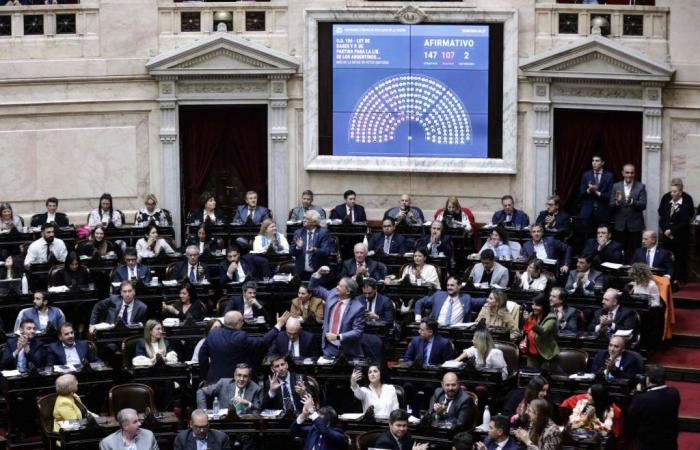After months of debate on a profoundly revised text, Argentine deputies definitively approved, on Friday June 28, the deregulatory economic reform program of ultraliberal President Javier Milei. “We will give President Milei’s government the tools it needs to reform the state once and for all.”said Gabriel Bornoroni, the leader of the ruling bloc in parliament.
For the political scientist and economist Pablo Tigani, interviewed by Agence France-Presse (AFP), this green light for Mr. Milei means politically “a total success for the government”. However, in the economic field, “it will be a return to the policies of the 1990s with deregulation, privatization and the unconditional opening of the economy which will deal a heavy blow to industry and small and medium-sized national businesses”he estimated.
Even before the adoption of this package, President Milei was pleased to have achieved “the largest fiscal adjustment not only in the history of Argentina, but also in the history of humanity”His government immediately implemented a drastic all-out budgetary austerity programme, with the aim of “zero budget deficit” by the end of 2024, and thus tame chronic inflation (211% in 2023).
Read also | Article reserved for our subscribers In Argentina, Javier Milei gets Senate approval to deregulate the economy
Add to your selections
Poverty affects 55.5% of Argentines
But budget cuts, including the paralysis of public projects, coupled with a brutal devaluation (54%) of the peso in December 2023, have strangled purchasing power. A change of course on the economic level, which has repercussions on consumption, activity, employment in Argentina. Inflation in the country continued, in May, the gradual deceleration that began five months ago, to 4.2% over one month, the lowest in two and a half years but which remains overwhelming over one year, at 276. 4%.
The recession is also setting in with a contraction of 5.3% of the economy in the first quarter compared to the same period last year. Argentina’s gross domestic product (GDP) recorded a sharp decline of 5.1%, year-on-year, during the first quarter, while unemployment now hits 7.7% of the population, according to official figures published Monday June 24.
Read also | Article reserved for our subscribers In Argentina, Javier Milei faces economic realities
Add to your selections
Opposition and social movements are calling for a country in pain, with poverty increasing rapidly since the end of 2023. In the first half of 2024, precariousness affected 55.5% of the population, compared to 44.7% a year earlier, according to the Catholic University’s Social Debt Observatory (ODSA-UCA).







